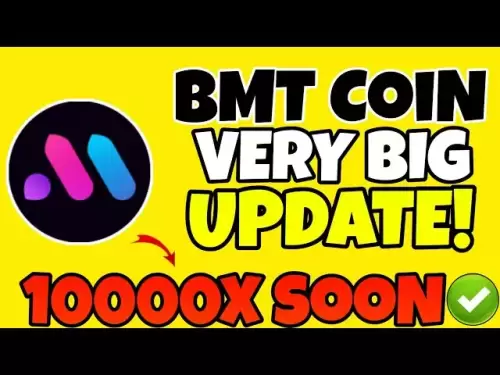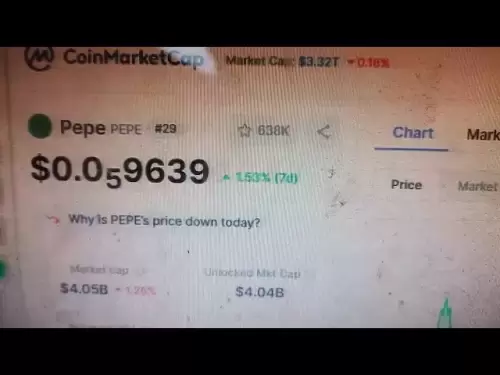-
 Bitcoin
Bitcoin $108,810.2974
0.81% -
 Ethereum
Ethereum $2,547.2589
2.01% -
 Tether USDt
Tether USDt $1.0003
0.00% -
 XRP
XRP $2.2725
2.39% -
 BNB
BNB $662.9418
1.38% -
 Solana
Solana $151.6325
3.50% -
 USDC
USDC $1.0000
-0.01% -
 TRON
TRON $0.2849
0.15% -
 Dogecoin
Dogecoin $0.1705
4.70% -
 Cardano
Cardano $0.5855
2.00% -
 Hyperliquid
Hyperliquid $39.3158
1.30% -
 Sui
Sui $2.9100
0.97% -
 Bitcoin Cash
Bitcoin Cash $495.1485
2.64% -
 Chainlink
Chainlink $13.4389
2.55% -
 UNUS SED LEO
UNUS SED LEO $9.0260
0.06% -
 Avalanche
Avalanche $18.2104
2.50% -
 Stellar
Stellar $0.2440
3.01% -
 Toncoin
Toncoin $2.9143
6.06% -
 Shiba Inu
Shiba Inu $0.0...01181
3.25% -
 Hedera
Hedera $0.1578
0.99% -
 Litecoin
Litecoin $87.8055
1.82% -
 Monero
Monero $317.3492
1.14% -
 Polkadot
Polkadot $3.3902
1.63% -
 Dai
Dai $0.9999
-0.01% -
 Ethena USDe
Ethena USDe $1.0001
-0.01% -
 Bitget Token
Bitget Token $4.4073
0.41% -
 Uniswap
Uniswap $7.3972
7.15% -
 Pepe
Pepe $0.0...01003
4.10% -
 Aave
Aave $275.5648
2.57% -
 Pi
Pi $0.4610
-0.26%
What is the Polymath (POLY) coin team’s vision for the future?
Polymath envisions a transformed securities market where efficiency, transparency, and accessibility prevail through its decentralized platform.
Dec 27, 2024 at 09:46 am

Key Points:
- Polymath's vision for a decentralized securities market
- Team's focus on regulatory compliance and user experience
- Plans for ecosystem expansion and global adoption
Polymath's Vision for the Future
Polymath is a blockchain platform that aims to revolutionize the issuance and trading of securities. The team envisions a future where securities can be seamlessly issued, traded, and settled on a decentralized platform, ensuring greater efficiency, transparency, and accessibility.
- Decentralized Securities Market: Polymath's goal is to create an open and accessible securities market where issuers and investors can interact directly, eliminating the need for intermediaries. Leveraging blockchain technology, Polymath enables the issuance of tokenized securities that represent real-world assets, such as stocks, bonds, and real estate.
- Regulatory Compliance: Recognizing the importance of regulatory compliance, Polymath places a strong emphasis on adhering to existing regulations and collaborating with regulators worldwide. The team works tirelessly to ensure that all securities issued on the platform meet regulatory requirements, fostering trust and stability within the ecosystem.
- User Experience: Polymath prioritizes user experience, making it easy for issuers and investors to participate in the decentralized securities market. The platform offers intuitive interfaces, comprehensive documentation, and support resources to streamline the onboarding and trading processes.
Team's Focus
The Polymath team comprises a diverse group of professionals with expertise in finance, technology, and regulatory matters. Their unwavering commitment to the project's vision has been instrumental in its success.
- Expertise in Finance: The team includes experienced investment bankers, financial analysts, and legal professionals who possess a deep understanding of capital markets. Their knowledge ensures that Polymath's platform aligns with industry best practices and meets the evolving needs of issuers and investors.
- Technology Excellence: The development team leverages cutting-edge blockchain technology to create a robust and scalable platform. Their technical expertise ensures that Polymath's infrastructure can support the issuance and trading of a wide range of securities, while maintaining high standards of security and efficiency.
- Regulatory Knowledge: Polymath's team is actively engaged with regulators worldwide, showcasing their commitment to compliance. Their regulatory expertise guides the platform's development and operations, fostering trust among issuers, investors, and regulators alike.
Plans for the Future
Polymath is continuously expanding its ecosystem and pursuing global adoption:
- Ecosystem Expansion: Polymath collaborates with partners across the blockchain and financial industries to enhance its platform's capabilities. The team explores integrations with other protocols, wallets, and decentralized applications to create a comprehensive ecosystem that meets the diverse needs of participants.
- Global Adoption: Polymath is committed to driving global adoption of its platform. The team actively engages with regulators and stakeholders worldwide, educating them about the benefits of decentralized securities markets. Polymath aims to establish partnerships and collaborations in key jurisdictions to facilitate the issuance and trading of securities on a global scale.
FAQs
- What is the purpose of the POLY token?
The POLY token is Polymath's native utility and governance token. It is used for staking, network fees, and participation in the platform's governance mechanisms, allowing token holders to influence the platform's future development.
- How does Polymath ensure regulatory compliance?
Polymath works closely with regulators and industry experts to ensure that its platform and token offerings comply with applicable laws and regulations. The team implements rigorous KYC/AML procedures, conducts due diligence on issuers, and collaborates with regulators on ongoing regulatory developments.
- What types of securities can be issued on Polymath?
Polymath supports the issuance of a wide range of securities, including equity, bonds, real estate investment trusts, and more. The platform provides customizable templates and tools to simplify the process of creating and issuing tokenized securities.
- Is Polymath a decentralized platform?
Yes, Polymath is a decentralized blockchain platform. It operates on a network of distributed nodes, ensuring that the platform is not controlled by any single entity. Transactions are verified and recorded on the blockchain, creating an immutable record of all activities.
- What is the future outlook for Polymath?
Polymath has a strong track record of innovation and collaboration, and its team is dedicated to driving the adoption of decentralized securities markets. The platform's focus on regulatory compliance, user experience, and ecosystem expansion positions it for continued growth and success in the rapidly evolving digital asset ecosystem.
Disclaimer:info@kdj.com
The information provided is not trading advice. kdj.com does not assume any responsibility for any investments made based on the information provided in this article. Cryptocurrencies are highly volatile and it is highly recommended that you invest with caution after thorough research!
If you believe that the content used on this website infringes your copyright, please contact us immediately (info@kdj.com) and we will delete it promptly.
- Litecoin Breakout Watch: What Traders Need to Know Now
- 2025-07-06 16:50:13
- Bitcoin, Solana, Ethereum: Decoding the Latest Buzz on the Blockchain
- 2025-07-06 16:50:13
- Widnes Resident's 50p Could Be Your Ticket to Easy Street: Rare Coin Mania!
- 2025-07-06 16:55:13
- Bitcoin, Solaris Presale, and Token Rewards: What's the Buzz?
- 2025-07-06 16:55:13
- Ethereum Under Pressure: Price Drop Amid Global Uncertainties
- 2025-07-06 17:00:13
- XRP, SEC Case, and Prosperity: A New Era for XRP Holders?
- 2025-07-06 17:10:13
Related knowledge

How to customize USDT TRC20 mining fees? Flexible adjustment tutorial
Jun 13,2025 at 01:42am
Understanding USDT TRC20 Mining FeesMining fees on the TRON (TRC20) network are essential for processing transactions. Unlike Bitcoin or Ethereum, where miners directly validate transactions, TRON uses a delegated proof-of-stake (DPoS) mechanism. However, users still need to pay bandwidth and energy fees, which are collectively referred to as 'mining fe...

USDT TRC20 transaction is stuck? Solution summary
Jun 14,2025 at 11:15pm
Understanding USDT TRC20 TransactionsWhen users mention that a USDT TRC20 transaction is stuck, they typically refer to a situation where the transfer of Tether (USDT) on the TRON blockchain has not been confirmed for an extended period. This issue may arise due to various reasons such as network congestion, insufficient transaction fees, or wallet-rela...

How to cancel USDT TRC20 unconfirmed transactions? Operation guide
Jun 13,2025 at 11:01pm
Understanding USDT TRC20 Unconfirmed TransactionsWhen dealing with USDT TRC20 transactions, it’s crucial to understand what an unconfirmed transaction means. An unconfirmed transaction is one that has been broadcasted to the blockchain network but hasn’t yet been included in a block. This typically occurs due to low transaction fees or network congestio...

How to check USDT TRC20 balance? Introduction to multiple query methods
Jun 21,2025 at 02:42am
Understanding USDT TRC20 and Its ImportanceUSDT (Tether) is one of the most widely used stablecoins in the cryptocurrency market. It exists on multiple blockchain networks, including TRC20, which operates on the Tron (TRX) network. Checking your USDT TRC20 balance accurately is crucial for users who hold or transact with this asset. Whether you're sendi...

What to do if USDT TRC20 transfers are congested? Speed up trading skills
Jun 13,2025 at 09:56am
Understanding USDT TRC20 Transfer CongestionWhen transferring USDT TRC20, users may occasionally experience delays or congestion. This typically occurs due to network overload on the TRON blockchain, which hosts the TRC20 version of Tether. Unlike the ERC20 variant (which runs on Ethereum), TRC20 transactions are generally faster and cheaper, but during...

The relationship between USDT TRC20 and TRON chain: technical background analysis
Jun 12,2025 at 01:28pm
What is USDT TRC20?USDT TRC20 refers to the Tether (USDT) token issued on the TRON blockchain using the TRC-20 standard. Unlike the more commonly known ERC-20 version of USDT (which runs on Ethereum), the TRC-20 variant leverages the TRON network's infrastructure for faster and cheaper transactions. The emergence of this version came as part of Tether’s...

How to customize USDT TRC20 mining fees? Flexible adjustment tutorial
Jun 13,2025 at 01:42am
Understanding USDT TRC20 Mining FeesMining fees on the TRON (TRC20) network are essential for processing transactions. Unlike Bitcoin or Ethereum, where miners directly validate transactions, TRON uses a delegated proof-of-stake (DPoS) mechanism. However, users still need to pay bandwidth and energy fees, which are collectively referred to as 'mining fe...

USDT TRC20 transaction is stuck? Solution summary
Jun 14,2025 at 11:15pm
Understanding USDT TRC20 TransactionsWhen users mention that a USDT TRC20 transaction is stuck, they typically refer to a situation where the transfer of Tether (USDT) on the TRON blockchain has not been confirmed for an extended period. This issue may arise due to various reasons such as network congestion, insufficient transaction fees, or wallet-rela...

How to cancel USDT TRC20 unconfirmed transactions? Operation guide
Jun 13,2025 at 11:01pm
Understanding USDT TRC20 Unconfirmed TransactionsWhen dealing with USDT TRC20 transactions, it’s crucial to understand what an unconfirmed transaction means. An unconfirmed transaction is one that has been broadcasted to the blockchain network but hasn’t yet been included in a block. This typically occurs due to low transaction fees or network congestio...

How to check USDT TRC20 balance? Introduction to multiple query methods
Jun 21,2025 at 02:42am
Understanding USDT TRC20 and Its ImportanceUSDT (Tether) is one of the most widely used stablecoins in the cryptocurrency market. It exists on multiple blockchain networks, including TRC20, which operates on the Tron (TRX) network. Checking your USDT TRC20 balance accurately is crucial for users who hold or transact with this asset. Whether you're sendi...

What to do if USDT TRC20 transfers are congested? Speed up trading skills
Jun 13,2025 at 09:56am
Understanding USDT TRC20 Transfer CongestionWhen transferring USDT TRC20, users may occasionally experience delays or congestion. This typically occurs due to network overload on the TRON blockchain, which hosts the TRC20 version of Tether. Unlike the ERC20 variant (which runs on Ethereum), TRC20 transactions are generally faster and cheaper, but during...

The relationship between USDT TRC20 and TRON chain: technical background analysis
Jun 12,2025 at 01:28pm
What is USDT TRC20?USDT TRC20 refers to the Tether (USDT) token issued on the TRON blockchain using the TRC-20 standard. Unlike the more commonly known ERC-20 version of USDT (which runs on Ethereum), the TRC-20 variant leverages the TRON network's infrastructure for faster and cheaper transactions. The emergence of this version came as part of Tether’s...
See all articles

























































































